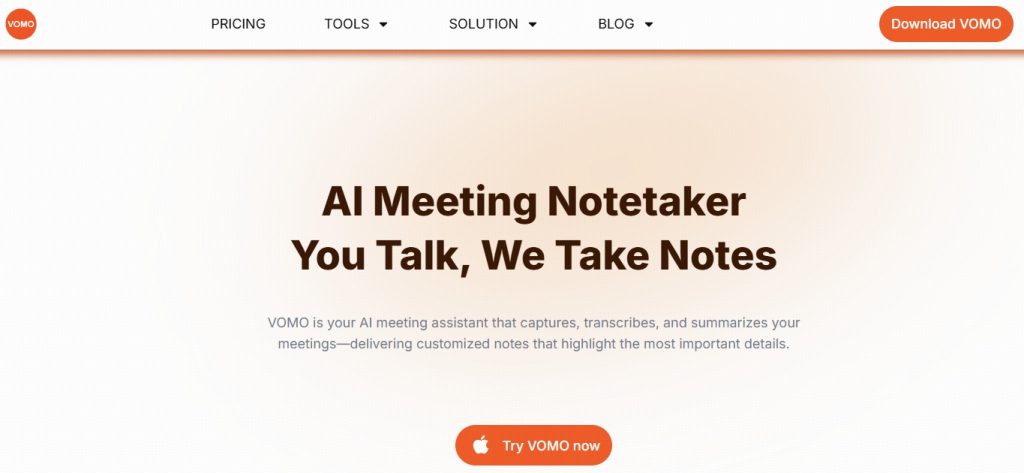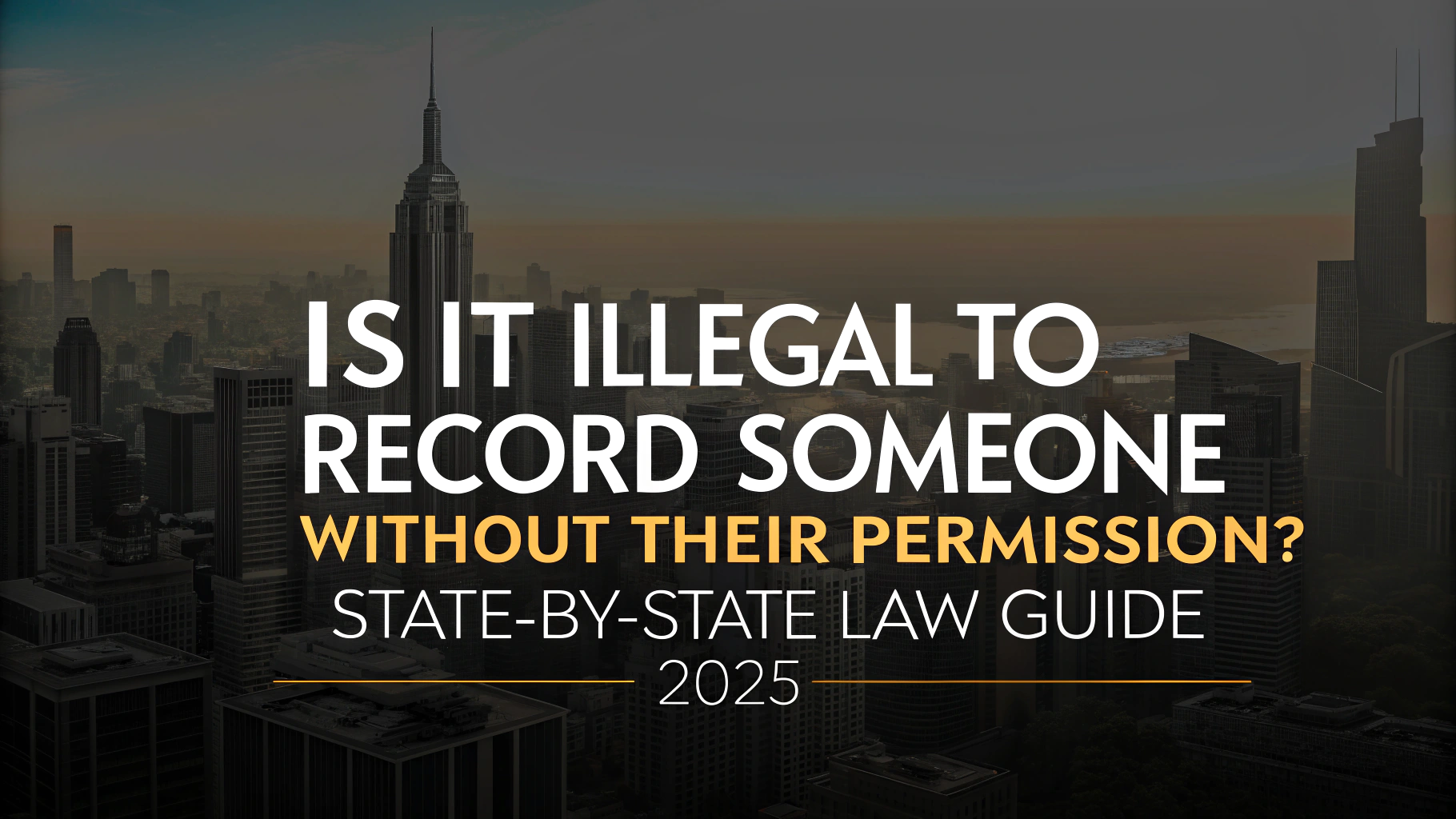Is It Illegal to Record Someone Without Their Permission?
The short answer: it depends on where you are and whether you’re part of the conversation. In the United States, both federal and state laws govern audio recording consent. While federal law generally allows one-party consent, many states have stricter rules. If you’re not sure about your local law, it’s best to assume you need everyone’s consent.
This is a guide to U.S. federal recording consent laws, with a state-by-state breakdown to help you understand when and how to record responsibly.
Please note that this guide is not legal advice—it is intended only as a general summary and overview of applicable laws. If you have specific questions or need legal assistance based on your situation, you should consult a qualified attorney.
When Is Recording Without Consent Legal or Illegal?
Understanding how the law applies to different situations can help you avoid legal issues:
Workplace meetings: Generally acceptable if you’re a participant in a one-party consent state. Risky in two-party consent states.
Private conversations: Sensitive; always get consent, especially in relationships.
Sales or customer calls: Consent is usually required, especially when recorded for training or legal purposes.
Educational settings: Laws vary—always inform and get approval before recording in classrooms or tutoring sessions.
Safety and evidence: Some states allow recording if it’s used to gather evidence of a crime.
Federal Recording Laws: The One-Party Consent Rule Explained
Let’s start with a brief overview of the relevant laws.
At the federal level, two key statutes apply: the Federal Wiretap Act and the Electronic Communications Privacy Act (ECPA).
Under these laws, recording a conversation is legal as long as at least one party consents. This means you can record your own calls without informing the other person. However, this federal baseline has been superseded by stricter state laws in many cases.
The Wiretap Act provides exceptions for individuals authorized by law, such as law enforcement agencies, to record secretly, as well as situations where at least one party consents to the recording—commonly known as “one-party consent.”
This includes:
- Authorized law enforcement surveillance
- Public events or speeches where no expectation of privacy exists
This brings us to two important legal concepts you need to understand: One-Party Consent and Two-Party Consent.
One-Party vs. Two-Party Consent: What’s the Difference?
- One-party consent: Only one participant (which can be you) needs to know and agree to the recording.
- Two-party (all-party) consent: Everyone involved must be informed and agree.
The difference is extremely important.
Misunderstanding the difference can lead to criminal penalties. For example, recording a call in California (a two-party state) while you are in Texas (a one-party state) can still get you into legal trouble.
State-by-State Recording Laws
Here’s a quick breakdown of the laws by state in 2025,You can use search tools to determine the laws applicable in your location.:
One-Party Consent States (38 states + DC):
- Alabama
- Alaska
- Arizona
- Arkansas
- Colorado
- District of Columbia
- Georgia
- Hawaii
- Idaho
- Indiana
- Iowa
- Kansas
- Kentucky
- Louisiana
- Maine
- Michigan
- Minnesota
- Mississippi
- Missouri
- Nebraska
- Nevada*
- New Jersey
- New Mexico
- New York
- North Carolina
- North Dakota
- Ohio
- Oklahoma
- Rhode Island
- South Carolina
- South Dakota
- Tennessee
- Texas
- Utah
- Vermont
- Virginia
- West Virginia
- Wisconsin
- Wyoming
*Note: Nevada requires all-party consent for phone calls but one-party for in-person conversations.
Two-Party Consent States (12 states):
- California
- Connecticut*
- Delaware
- Florida
- Illinois
- Maryland
- Massachusetts
- Montana
- New Hampshire
- Oregon*
- Pennsylvania
- Washington
*Note: Connecticut and Oregon have mixed rules. In-person and phone call consent requirements may differ.
Is It Legal to Record in Public Places? (Street, Cafes, Stores, etc.)
In general:
- Public spaces: Recording is legal if there is no “reasonable expectation of privacy.”
- Semi-public spaces (e.g., restaurants, malls): Can set their own rules.
- Private spaces (e.g., bathrooms, dressing rooms): Recording is illegal due to implied privacy.
But, It is important to note that even in public, if you’re capturing audio of a private conversation, consent laws may still apply.
Can I Record Phone Calls or Zoom Meetings?
- Phone calls: Follow the laws of both states involved.
- Zoom/Google Meet: Best practice is to disclose recording and obtain verbal or written consent.
- Automated beeps or pop-up notifications can provide clear notice.
Some platforms include a default notice, but it’s still your responsibility to confirm compliance with the law.
Legal Penalties: What Happens If You Record Illegally?
Penalties vary by state and may include:
- Criminal charges: Misdemeanors or felonies
- Civil lawsuits: You may be liable for damages
- Evidence exclusion: Illegally recorded material may not be admissible in court
Examples include lawsuits over privacy invasion and criminal charges for wiretapping.
States Where Illegal Recording May Result in Criminal Charges
The following list is very important.
The states included have strict laws requiring all parties involved in a conversation to consent to any recording. In these states, recording without the permission of every participant may result in criminal charges, including fines and imprisonment.
It is essential to ensure that you do not record illegally in these jurisdictions.
These states include:
- California
- Connecticut*
- Delaware
- Florida
- Illinois
- Maryland
- Massachusetts
- Montana
- New Hampshire
- Oregon*
- Pennsylvania
- Washington
*Note: Connecticut and Oregon have mixed consent laws, which means the rules can differ depending on whether the conversation is in person or over the phone.
Because these states enforce “two-party” or “all-party” consent laws, secretly recording a conversation without permission is considered illegal and may carry serious legal consequences. To avoid criminal liability, always ensure that you have explicit consent from all parties before recording any conversation in these jurisdictions.
Best Practices: How to Record Conversations Legally and Respectfully
- Always ask for consent before recording
- Use verbal confirmation and record the acknowledgment
- Provide written notices in business or educational settings
- Use tools that notify all parties when a recording is in progress
- Consider including consent disclaimers in agreements or onboarding
Recommended Tools
VOMO (AI-powered meeting transcription)

Otter.ai (auto-transcription and consent alerts)
Frequently Asked Questions (FAQs)
Can I record my boss without their consent?
Depends on the state. In a one-party state, yes, if you’re part of the conversation.
What if the conversation crosses state lines?
Follow the stricter state’s law. If California is involved, you’ll likely need all-party consent.
Can I record a conversation I’m not part of?
No. That’s wiretapping and illegal under federal and state law.
How do I prove I had consent?
Keep a record of written approval, or record the part of the call where you ask and receive consent.
Conclusion: Always Ask for Permission When in Doubt
When it comes to recording conversations, the safest route is to ask for permission. Whether you’re in a one-party or two-party state, being transparent helps build trust and protects you legally.
If you’re unsure, consult an attorney or check your state’s statutes directly before recording.


